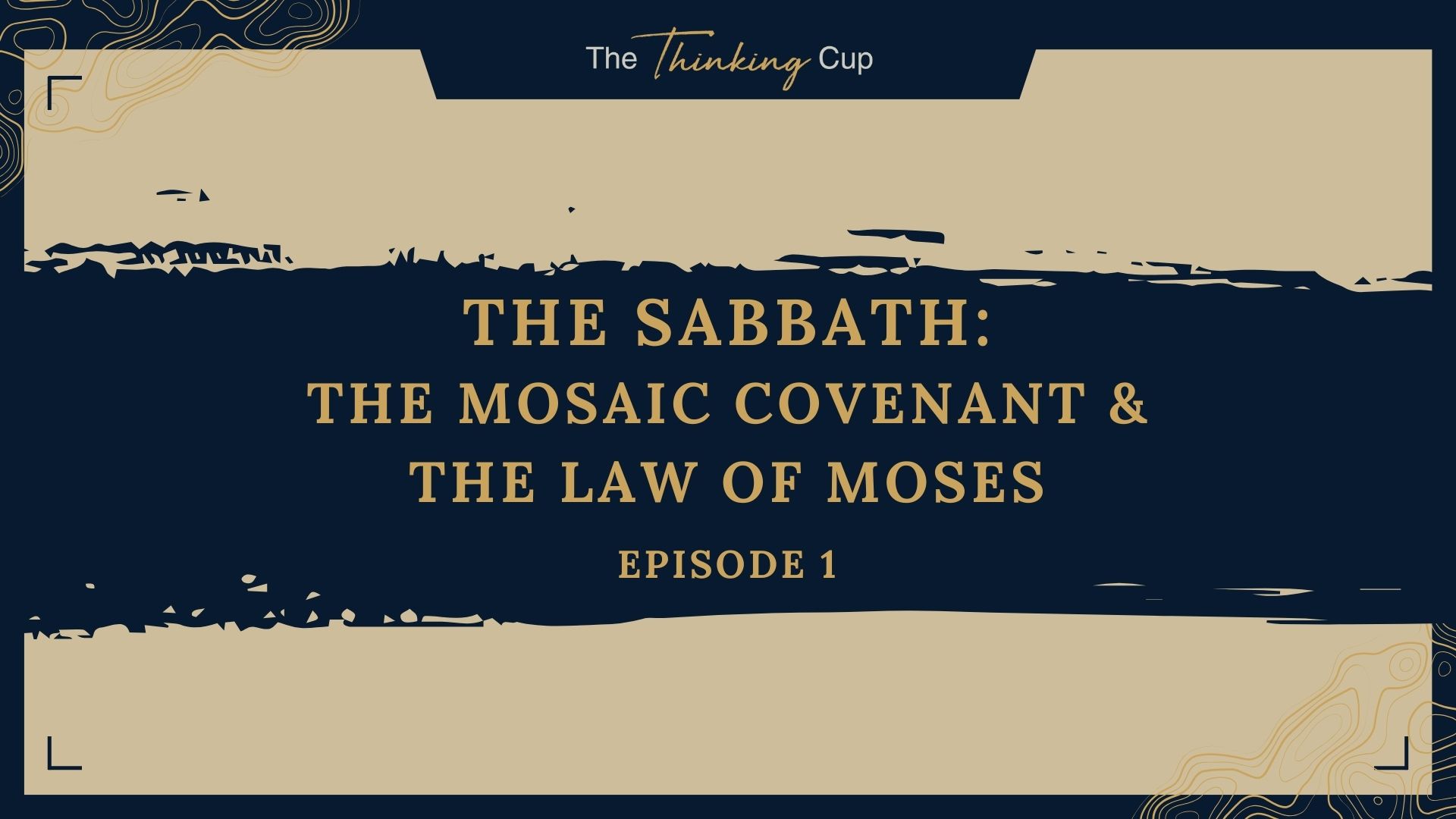The relationship between the Mosaic Covenant and the Law of Moses has been a point of theological debate. Many who adhere to Covenant Theology argue that the Law of Moses continues to serve as a rule of life for believers today and use this assertion to support their broader theological framework. A common argument presented is that since God is unchanging, the moral code of the New Testament must be a continuation of the Old Testament law. Some go as far as to suggest that distinguishing between Old Testament law and New Testament law creates two conflicting moral codes, which would imply two different gods. They cite passages such as James 4:11–12 and Romans 13:8–10 to argue that biblical law remains a singular, continuous system stretching from the Old Testament into the New. Furthermore, they claim that because God’s moral laws on issues such as adultery, theft, and blasphemy remain unchanged, there is no reason to differentiate between Old and New Testament law.
However, this perspective does not hold up under closer examination. While it is true that God’s moral character does not change, the way He administers His commands has changed throughout history. Even those who advocate for a continuous law system do not consistently apply their own claims. They often dismiss the ceremonial aspects of the Mosaic Law while selectively holding onto what they deem as “moral” laws that align with their theological framework. For example, prohibitions against wearing garments made of mixed fabrics (Lev. 19:19) and dietary restrictions from Leviticus 11 are often ignored. Yet, Jesus explicitly declared all foods clean in Mark 7:19, and the apostles reaffirmed this in Romans 14:14. Similarly, while some claim that the Ten Commandments remain binding (the Seventh-day Adventist Church), they frequently reinterpret the fourth commandment concerning the Sabbath, adjusting its application to fit New Testament practice.
The reality is that those who argue for the continued relevance of the Mosaic Law must make significant modifications to its application in order to make it fit within their theological system. As Fruchtenbaum notes, even when they attempt to limit their application of the Mosaic Law to the Ten Commandments, they must substantially alter the meaning of the Sabbath commandment. [1] This inconsistent approach weakens the claim that the Mosaic Law remains a unified and binding system.
A more biblically consistent approach recognizes that the Mosaic Law was given specifically to Israel and was never intended to be a rule of life for the Church. Paul emphasizes this distinction in passages such as Romans 6:14, where he explicitly states that believers are not under the law but under grace.
“For sin will have no dominion over you, since you are not under law but under grace.” (Romans 6:14, ESV)
Similarly, Galatians 3:24–26 explains that the law served as a tutor to lead Israel to Christ but is no longer in effect for those who have come to faith.
“So then, the law was our guardian until Christ came, in order that we might be justified by faith. But now that faith has come, we are no longer under a guardian, for in Christ Jesus you are all sons of God, through faith.” (Galatians 3:24–26, ESV)
This view acknowledges continuity in moral principles while recognizing the shift from the Mosaic Covenant to the New Covenant.
Scholars such as Charles Ryrie and John Feinberg have pointed out that attempting to impose the Mosaic Law on New Testament believers leads to theological inconsistency.
Ryrie writes,
“To insist on the continued application of the Mosaic Law while selectively applying its commands is to ignore the progress of revelation and the fulfillment of the law in Christ” (Dispensationalism, 1995, p. 117). [2]
Feinberg, being quoted in Fruchtenbaum’s book Isrealology: The Missing Link in Systematic Theology, similarly notes that “The Law of Moses ‘was addressed and given to one people and only one—Israel.’” [3] Keeping the law inside this context, one should understand that the Law given to Israel must be understood within this historical and theological context. That is Israel’s historical and theological context.
Ultimately, while different theological perspectives may agree on many moral principles, their conclusions differ based on how they understand biblical covenants. A careful reading of Scripture demonstrates that believers today live under the Law of Christ, which includes moral principles that transcend covenantal distinctions but remain distinct from the Mosaic Law. The fundamental issue is not whether morality remains consistent across the Testaments but whether the Mosaic Law itself remains in force for the Church. Scripture clearly teaches that Mosaic Law is not in force today, and any attempts to merge the Law of Moses with the Law of Christ ultimately lead to theological confusion. (A.K.A the Seventh-day Adventist Theological framework)
The Unity of the Law of Moses
Many Christians have developed misconceptions about the nature of the Mosaic Law, leading to significant confusion regarding its application today. One common misunderstanding is the tendency to divide the Law of Moses into three categories: ceremonial, legal (or civil), and moral commandments. This approach has led many to believe that while the ceremonial and legal aspects no longer bind believers, they are still obligated to follow the moral commandments. Another widespread assumption is that the Ten Commandments remain binding while the remaining 603 commandments have been set aside. However, these distinctions, though convenient for study, do not align with the way Scripture presents the Law.
The Bible consistently portrays the Mosaic Law as a single, unified entity. The Hebrew word Torah (“law”) and the Greek word nomos used in the New Testament are always singular when referring to the Law of Moses. Nowhere does Scripture divide the law into separate categories or suggest that certain portions remain in effect while others do not. Furthermore, there is no biblical basis for isolating the Ten Commandments from the rest of the Mosaic Law and treating them as perpetually binding. Instead, all 613 commandments form one cohesive legal system, given exclusively to Israel. (I have written three extensive blog articles on this topic. You can find them here: Should the Laws of God be Divided?)
This principle of unity is emphasized in James 2:10, which states,
“For whoever keeps the whole law but fails in one point has become guilty of all of it.” (James 2:10, ESV)
The implication is clear: violating even a single commandment renders a person guilty of breaking the entire Law of Moses. If the law were divided into separate parts, breaking one commandment would not result in guilt for the whole. However, because the law functions as a unit, breaking a dietary law—such as eating ham—renders a person guilty of breaking all of the commandments, including the Ten Commandments, even though they do not explicitly mention dietary restrictions.
A proper understanding of the Law of Moses requires recognizing that it cannot be arbitrarily divided into sections that are still binding and others that are not. While commonly employed to support theological frameworks, this approach lacks scriptural support. Dr. Robert Lightner, a professor at Dallas Theological Seminary, reinforces this point in a series of articles published in the Academic Journal Bibliotheca Sacra Vol. 143. Lightner published three articles that deal with this issue.
He states,
“While these divisions of the Mosaic Law may be helpful, they must not be viewed as inspired and therefore divinely authoritative.” [4]
He explains that the law was given as an indivisible whole and that attempts to divide it for the purpose of maintaining certain aspects while discarding others introduce an entirely foreign concept to the Old Testament. [5]
The apostle Paul further confirms the unity of the law in Galatians 5:3, where he warns that anyone who chooses to be circumcised is thereby obligated to keep the entire law.
“I testify again to every man who accepts circumcision that he is obligated to keep the whole law.” (Galatians 5:3, ESV)
This argument only makes sense if the Law of Moses is an all-or-nothing system. Likewise, James 2:10 reinforces the point by declaring that breaking one part of the law makes a person guilty of breaking it all. These statements make it clear that the law cannot be selectively applied without violating its inherent unity.
Many who insist on retaining portions of the Mosaic Law ultimately find themselves inconsistent in its application. For example, those who argue for the continued validity of the Ten Commandments often struggle with the fourth commandment concerning the Sabbath. (This is the main ‘gotcha’ that Seventh-day Adventists like to attach their arguments for Sabbath to with other Sunday Church goers.) If one asserts that the Ten Commandments remain binding while disregarding the Sabbath commandment or modifying its requirements, one must acknowledge an inconsistency in their interpretation. This demonstrates the difficulty of maintaining a partial adherence to the Mosaic Law while denying its full application.
A more coherent approach acknowledges that the Law of Moses was given exclusively to Israel as a covenantal system and has been replaced by the Law of Christ. Paul explicitly states in Romans 6:14,
“For sin will have no dominion over you, since you are not under law but under grace.” (Romans 6:14, ESV)
In Galatians 3:24–25, he explains that the law was a temporary guardian leading to Christ but is no longer in effect for believers. These passages confirm that the Mosaic Law, as a unified system, has been set aside and replaced by a new covenant.
The continued attempt to uphold portions of the Mosaic Law while disregarding others is a theological inconsistency that biblical exegesis cannot sustain. Lightner and Fruchtenbaum argue that the Law of Moses was a single entity given to Israel and cannot be selectively applied to the Church today. Those who claim to uphold it must either follow all 613 commandments or acknowledge that the entire system has been set aside in favor of the Law of Christ. Understanding this distinction is crucial for a proper biblical approach to the role of the law in the life of believers.
In Christian Love,

[1] Arnold G. Fruchtenbaum, Israelology: The Missing Link in Systematic Theology, Rev. ed. (Tustin, CA: Ariel Ministries, 1994), 640-641.
[2] Charles C. Ryrie, Dispensationalism, New edition (Chicago: Moody Publishers, 2007).
[3] Arnold G. Fruchtenbaum, Israelology: The Missing Link in Systematic Theology, Rev. ed. (Tustin, CA: Ariel Ministries, 1994), 493.
[4] Robert P. Lightner, “Theological Perspectives on Theonomy Part 3: A Dispensational Response to Theonomy,” Bibliotheca Sacra 143 (1986): 237.
[5] Ibid.




I’ve been perusing your articles. I think they have many valid logical points. However, the logic seems to breakdown by lumping the Ten Commandments written by the finger of God on stone as completely equivalent to the remainder physically written by Moses on paper. I have a hard time understanding the practicality of the outworking of this in day to day living. For example, it doesn’t seem to pass the straight-face test that we could by habit/regularly take God’s name in vain, have idols, worship other Gods, dis-honor our parents, murder, steal, commit adult and covet on a regular basis and still claim we are God followers. Yet, if it is ones regular practice to not remember the Sabbath to keep it holy we and not under law but under grace and not need to be concerned? How do you reconcile this?
I would point you to the series on Covenant Theology to further understand this concept:
https://youtube.com/playlist?list=PLDbvYGM2LNrwRUxcSw6VP6ZwAGxzyHEbF&si=ojNRzdoJVfAXBR7V